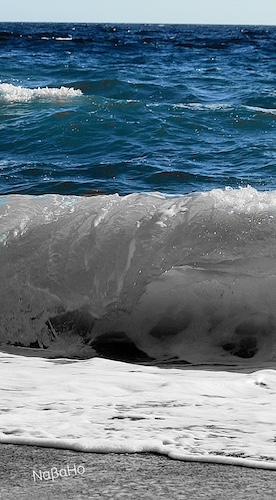(Photo: Nabaho Kayaker)
Summer can offer pleasant warmth or unpleasantly high temperatures of a heatwave. In recent days, a strong wind has been added to that: a wind that in the afternoon can blow you off your feet with the scorching hot air of a fire-breathing dragon. The gods had actually intended this summer north wind as a refreshment for the islands – but, like many things that get out of hand, the Meltemi seems a bit out of control. Or have the gods introduced a new wind?
I could give a very technical explanation about the origin of the cooling Meltemi – about the cooperation of a low-pressure area over India, another one over Turkey and a high-pressure area over the Azores – but I’m not a meteorologist, so it’s easier to begin with the myths.
One myth is about the Athenian Icarus, who received a large barrel of wine from Dionysus, who had married his daughter. Icarus shared the wine with his friends who were shepherds. They had never heard of wine, let alone drunk it and got quite tipsy. Because they didn’t understand their confused state, they thought Icarus had tried to poison them: so they killed him. His newly married daughter was driven mad with grief and hanged herself. The widowed Dionysus was furious and unleashed a strange disease upon Athens that caused all the unmarried girls to commit suicide. Desperate, the Athenians consulted the oracle at Delphi. There it was revealed that the murderers of Icarus were hiding on the Cycladic island of Kea; so the beekeeper Aristaeus travelled there, killing the murderers and then offering sacrifices to Zeus to thank him for the successful outcome. That pleased the almighty Zeus so much that he sent a wind to cool the island.
It is also said that Zeus wanted to save the island of Rhodes from a drought and therefore sent a strong wind toward it that brought rain. However, in general, the Meltemi is a dry wind that brings not a drop of water. Another story is about the Greek hero Hercules. He shot dead two sons of Boreas (the god of the north wind) on the Cycladic island of Tinos, because they had played a trick on him. Boreas was so angry that he sent a howling wind in revenge to the island.
That sounds a bit like the wind that a few days ago was roaring around the house, slamming open shutters and sending tables fly into the air. If you’re not afraid of flying garden furniture, then it’s only as a sailor that you need to watch out for this risky wind that can suddenly pick up.
Even Poseidon, god of the sea, uses the summer wind to propel ships a bit faster on his waters and to cool the Aegean Sea considerably. When the Meltemi arrives and the water approaches a soup temperature Poseidon stirs the waves thoroughly with his trident to bring up the cold water from the depths, sending the warm surface water down to the fish below, as if they are waiting for a pleasant summer vacation. So you can suddenly find yourself in an ice-cold sea in mid-August.
The Meltemi aims at the Cyclades, and Lesvos is quite a distance away from there. Nevertheless, the island has been besieged for days by a capricious north wind, which, if it wasn’t the Meltemi itself, was certainly a relative of this god-invented natural air conditioner. I have the impression that this brutal wind has lasted longer than six days (while the Meltemi is supposed to mostly blow for only two to six days). Another characteristic of the Meltemi is that it often picks up in the afternoon. But this wind has howled to its own timetable and irregularly indulged in coffee breaks to calm the sea for a moment. He blew down showers of stars from the sky and sleepers from their beds.
It’s almost unimaginable that you could long for a good old-fashioned day in a heatwave, with an azure sea reflecting the island like a mirror. But still, when your food is threatened with flying off your plate and your wine glass has already blown over twice, you do get dreams of a day without the Meltemi.











